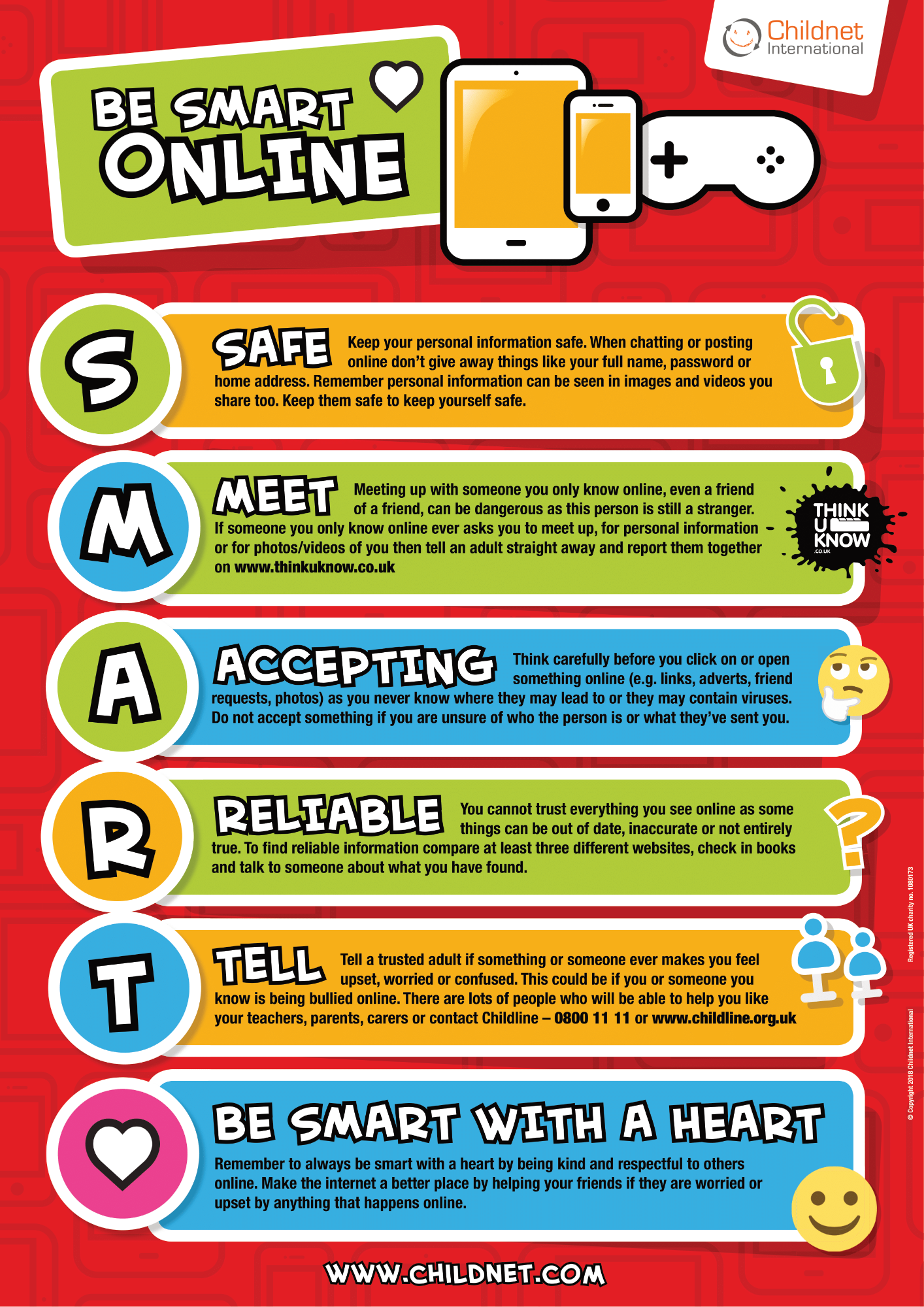 Proud to be a part of Cornwall Education Learning Trust
Proud to be a part of Cornwall Education Learning Trust

Online safety
We are always talking to our children about helping themselves to stay safe online. We talk to them about the SMART rule and sharing ways to empower them to take responsibility for their online activity. Please see the poster for more information about this rule.
The children understand that if they see something online that makes them feel scared or worried they need to act immediately:
- Close /turn over/ walk away from the device
- Tell an adult who can help them deal with the situation
Please talk to your children about the SMART rule and also ensure that, as a family, you have a plan that everyone is aware of, that can be actioned immediately if they feel threatened by anything they come across when they are online.
Childnet has a variety of resources available to help you keep your child safe online.
Smart Rules for Internet Safety

Top e-safety tips
Our friends at Internetmatters.org have some top E-safety tips.
- Put yourself in control - Make use of the parental controls with your home broadband. There are many guides on how to do this, but if you are unsure, you can come and talk to us or ask your provider for advice.
- Search safely - Use child-friendly search engines such as Swiggle Search Engine. This will help to keep your searches safe and appropriate.
- Agree boundaries - Set clear times for using the internet which allow time for breaks and other activities. This can also include the information that they can search for or videos they can watch.
- Explore together - If possible, spend time with your child while they search or have the device in a family room. That way, you can talk about their online activity and help them if they get stuck or unsure. It's also a great way to monitor their online identity and usage.
- Check if it's suitable - A fantastic website that gives advice on all types of media, is commonsensemedia.org. This gives you details about the age appropriateness of all things from books, movies, games and much more. You can see about the latest releases and learn about them before deciding if they are right for your use.
- Set up a favourites list of sites that you can share with them, that you have previously checked.
- Use your internet browser settings or your router settings to block websites or only allow appropriate sites to be viewable.
There are many sites that offer advice and information for you and your children to share and discuss. We have listed some of the best ones here for you.
- DfE - Advice for parents and carers on cyberbullying
- National Online Safety – Weekly guidance for games, apps and websites
- CEOP (Child Exploitation and Online Protection)
- Childnet – Helping make the internet a great and safe place
- UK Safer Internet Centre
- ThinkUKnow – empowering children and young people with some great videos
- Internet Matters – Set up by the largest internet providers in the UK
- Common sense media - A great resource offering advice, explainers, conversations, and so much more
- Parent Zone - Browse free digital guides, videos, information and education resources, building national media literacy
Screen Time
We know that there are many positives about screen time, according to a recent survey conducted by RCPCH, children stated the following as the top 3 positives:
- Gives you knowledge
- It’s entertaining and enjoyable
- Provides you with more opportunities to reach a wider community
We have all seen a natural increase over recent years as screen time has allowed us to access work and learning and most importantly keep in touch with family and friends when we have been unable to see them. However, now that we are beginning to make the journey out of lockdown, and we are back at school for our learning, we need to think about how much screen time we are having. Some issues associated with too much screen time include:
- Loss of social connection - it stops you from talking to the people around you
- Eye concerns - it can hurts your eyes, make them tired/blurry if you are on screen for too long
- Sleep interference - screen time before bed can stop you from sleeping and having a screen in your room (TV, mobile phone, iPad, games console etc) also prevents a good sleep pattern as the temptation to watch, respond or play can be hard to ignore.
We thought it would be a good time to have a think about how we can reduce the time spent on screen, and do some physical activities instead. Here are some top tips to help you manage family screen time. So let’s all try and TURN OFF our screens and GET ACTIVE!
If you want to find out a little bit more about the health impacts of screen time, have a look at the fact sheet for parents (below) that has information about the impact and ideas to help you make changes.
Useful Parental Controls Guidance
Parents' training
The following videos from the Safer Internet Centre will help you in supporting your children in balancing the risks and benefits of using the internet and technology.
Internet Safety Resources
Internetmatters.org - the central location for advice and guidance for parents about all Internet Safety matters.
The UK Safer Internet site - lots of useful resources for parents including guides about how to talk about technology and how to set up your devices at home so they are safe.
Common Sense Media - site for parents with recommendations and advice about games/film/DVD/music content and it's suitability for children of different ages.
Know it All for Primary Schools - further guides and training featuring Captain Kara and Winston’s SMART crew: Childnet's Know IT All for Primary Schools has been especially designed for primary school staff to help them understand important E-safety issues and how to help young pupils get the most out of the internet.
Childnet - Childnet has advice for parents on a range of internet safety issues they may face.
Jessie and friends - This website, run by CEOP (The Child Exploitation and Online Protection Command), provides videos for children aged 4 - 7 to watch to help them understand risks online. There are also some helpful notes for parents about how to talk to their child about keeping themselves safe.
Internet Safety Curriculum
We follow the Purple Mash Internet Safety Curriculum. This is the first thing we teach every year during our Computing Lessons and we revisit this content at the start of every computing lesson. We also take part Internet Safety Week in February using the Safety Internet Day resources. We also spend a lot of time talking about internet safety through out PSHE curriculum. Across the school we use SMART and have Internet Safety Assemblies.
Contact
If you have any questions regarding e-safety, don’t hesitate to speak to Mr Donelly (online safety lead) where you can also find out how to get more involved!
